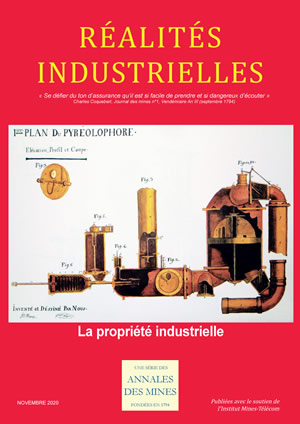| |

|
|
 Novembre 2020 - La propriété industrielle Novembre 2020 - La propriété industrielle
Le brevet unitaire : enfin un « guichet unique » pour les innovateurs dans l’Union européenne
Par Amaryllis VERHOEVEN
Head of the Intellectual Property Unit at the European Commission (DG GROW F3)
et
Denis DAMBOIS
Commission européenne (DG GROW F3)
L’Union européenne améliore et unifie depuis plusieurs décennies ses systèmes de propriété intellectuelle (PI), à la fois par l’harmonisation des législations nationales et la création de droits unitaires. En matière de brevets, le système du brevet européen présente des avantages indiscutables par rapport aux procédure nationales, mais souffre d’une résolution purement nationale des litiges. Cet inconvénient sera prochainement résolu par le futur système du brevet unitaire et plus précisément par l’instauration de la juridiction unifiée du brevet (« JUB »), qui constituera d’ailleurs la force principale du nouveau système une fois qu’il sera entré en vigueur. Deux événements imprévus ont malencontreusement perturbé sa mise en place : d’une part, le Brexit, qui empêchera la participation du Royaume-Uni à ce système et, d’autre part, le recours constitutionnel formé à l’encontre de la ratification par l’Allemagne de l’Accord relatif à la JUB et qui a donc retardé celle-ci. Il est cependant permis d’espérer que le système du brevet unitaire soit concrètement lancé dans un avenir proche, peut-être même dès 2021.
 Télécharger gratuitement l'article Télécharger gratuitement l'article
 Retour au sommaire Retour au sommaire
 November 2020 -Industrial property November 2020 -Industrial property
The long-awaited unitary patent, an effective one-stop-shop for innovators in the EU
Amaryllis Verhoeven,
head of the Intellectual Property Unit at the European Commission (DG GROW F3),
and
Denis Dambois,
European Commission (DG GROW F3)
The European Union has been improving and unifying its intellectual property (IP) systems since several decades, both by harmonising national legislations and creating unitary rights. As regards patents, the European patent system has undisputable advantages compared to the national procedures, but suffers from a purely national dispute resolution. This shortcoming will soon be addressed by the future unitary patent system, and more precisely by the Unified Patent Court (UPC), which will constitute the main strength of the new system once it will be operating. Two unexpected events have unfortunately disturbed its launch: on the one hand Brexit, which will prevent the UK’s participation in the new system, and on the other hand the constitutional challenge initiated against the decision of ratification by Germany of the UPC Agreement, which has delayed that ratification. One may however hope that the unitary patent system may be concretely launched in a near future, and possibly as soon as 2021.
 Retour au sommaire Retour au sommaire
|
|




